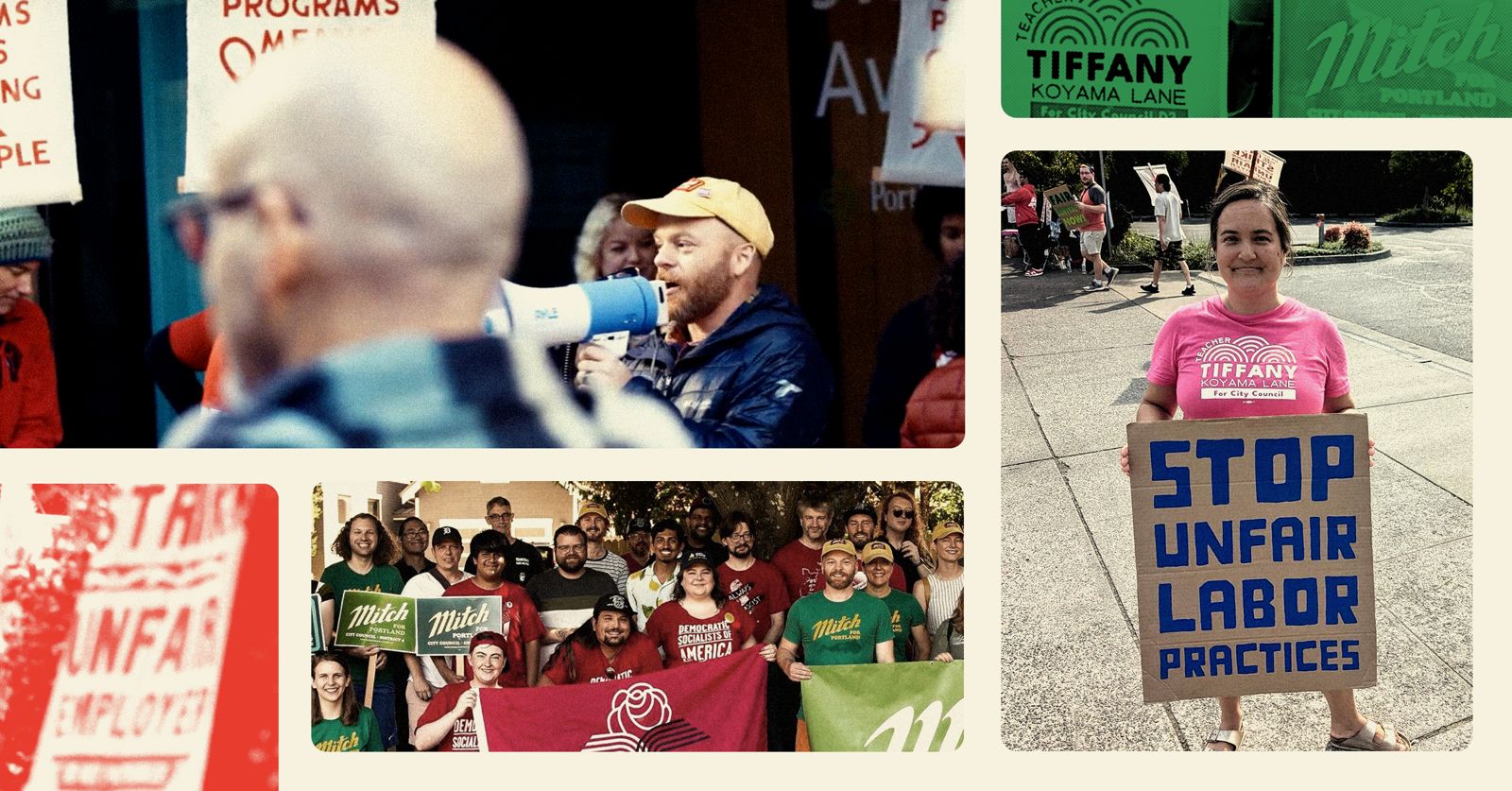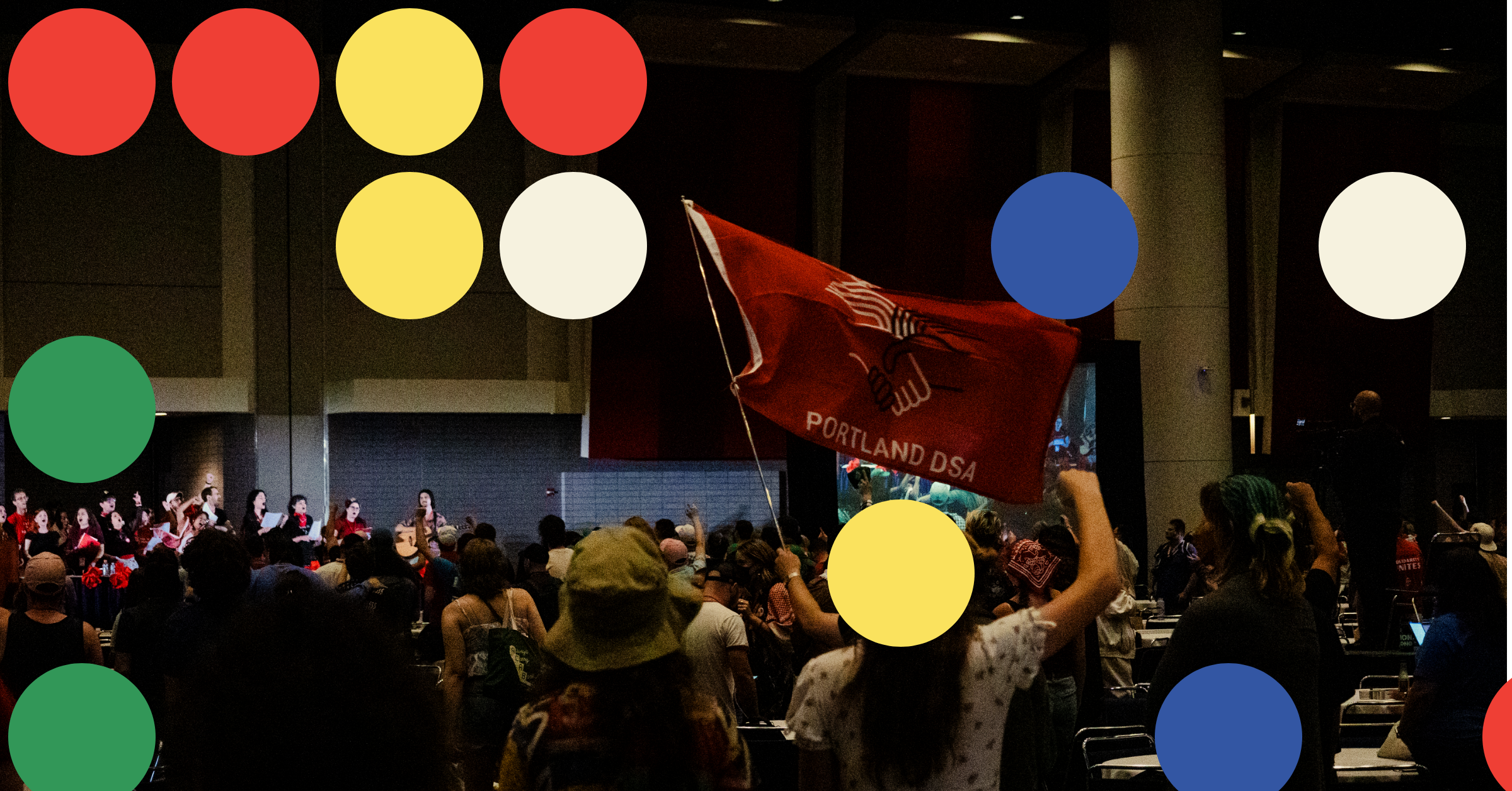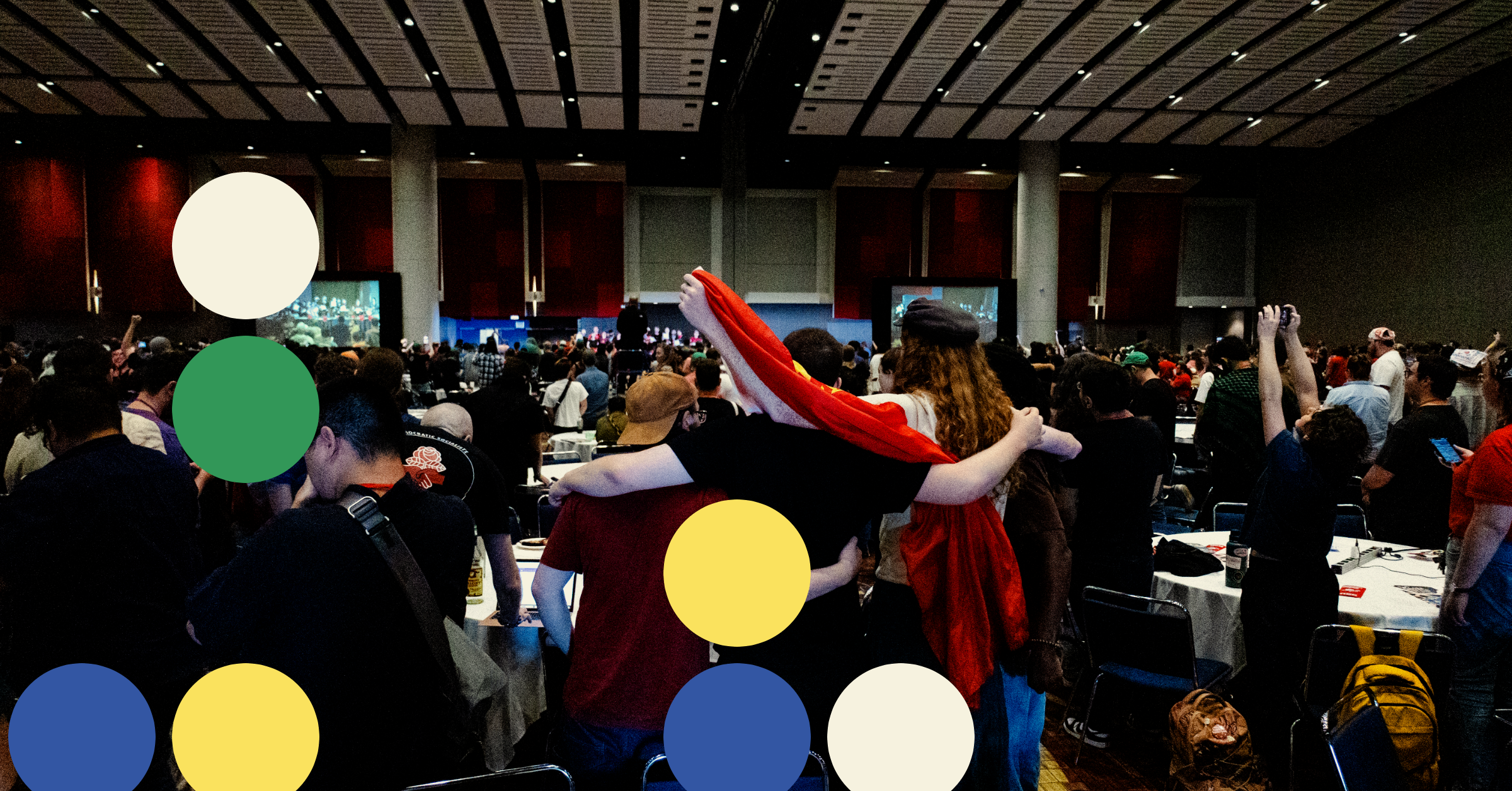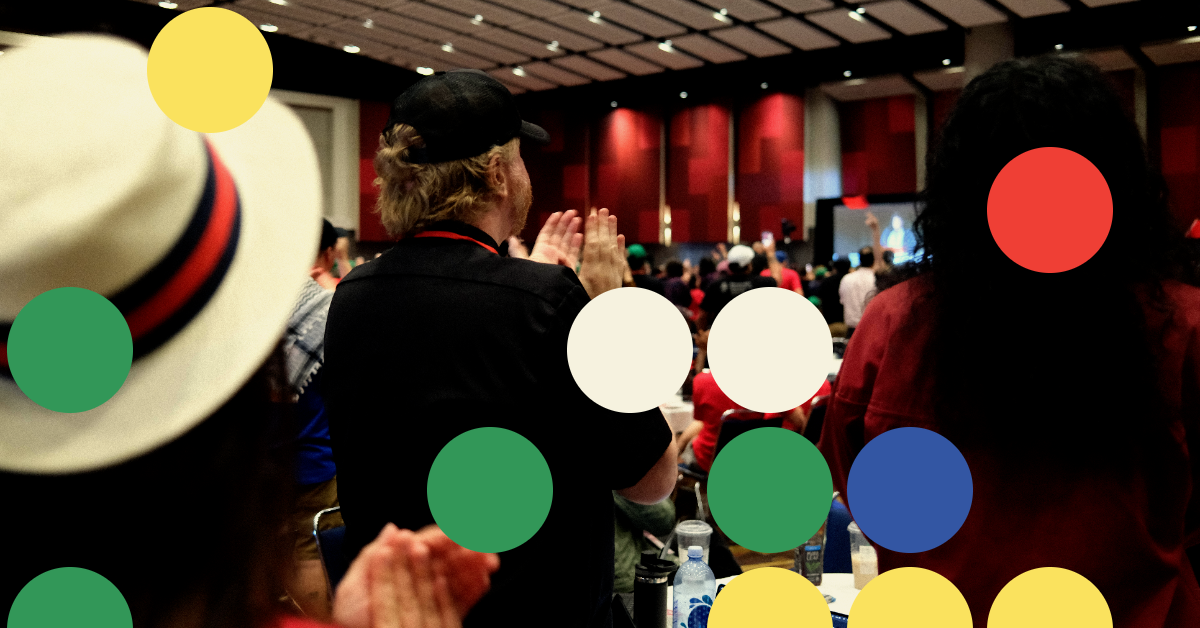An astounding 92 candidates competed for 12 seats on Portland City Council this year. Two were endorsed by DSA. Both won.
Tiffany Koyama Lane and Mitch Green were elected to city council with the city’s new electoral system: ranked choice voting in multi-member districts. The two campaigns knocked over 26,000 doors collectively and identified over 9,500 supporters across the two districts, 95% of whom voted according to the campaign’s internal data. And through consistent public recognition of the work of Portland DSA we also strengthened our chapter.
These wins are proof that we are reaping the benefits of our carefully considered choices. Our success came from prioritizing democracy in the chapter, building a strong sense of democratic socialist brand, drawing support from a robust multi-tendency membership, and powerful base building prior to and during this election cycle. Our strong field program was consistently recognized by reporters, and we are ending the cycle with proof that Portland DSA now plays a decisive factor in Portland area elections.
Tiffany Koyama Lane is a public school teacher and leader in her union, the Portland Association of Teachers, which went on strike last year. In a candidate forum, Tiffany stated, “The 2023 teacher strike showed (me) the power of collective action.” When a local paper asked if she had any regrets from the strike, she simply stated no, and later said: “I regret that our society does not value the work of teachers, school nutrition workers, or janitors until their absence becomes inconvenient.” She understands we must prioritize common-sense, proven solutions to public safety, housing, and the climate crisis and that we need to craft policies like social housing, a renters bill of rights, and funding the Portland Street Response (a non-police crisis response program) that address the root causes of these crises.
Mitch Green is a mainstay of Portland DSA and of karaoke bars. He’s been a member for six years and has served as chapter treasurer. He wears his DSA membership on his sleeve (and we love him for it). He’s an army veteran, energy economist, community college instructor, and union member who grew up in a union family. He’s committed his life to public service and to solving complex problems like the ones Portland currently faces. Like Tiffany, he ran with social housing at the forefront of his campaign, taught voters about socialism, and plans to pursue a renters bill of rights and funding for the Portland Street Response.
Before starting these campaigns, one of us (Hayley, who served as a Field Organizer on National DSA staff, alongside the National DSA Electoral Organizer) taught us lessons learned from other DSA chapters’ wins and losses. We took those lessons seriously and set goals in our planning based on those lessons. This piece collects the lessons from our latest campaign and shares our experience in hopes of giving other DSA chapters insights to take to their future fights.
DSA at the Forefront
This year we ran proud, out-loud Democratic Socialist campaigns. In the past we hid ourselves, or some might say “liquidated” ourselves, into various coalitions or projects. This was Portland DSA’s strategy for Universal Preschool (2020) and Eviction Representation for All (2023), which were both ballot measure campaigns we ran. It was also the dominant strategy for candidates in years past. This time we were clear and forceful about who we are and why we are organizing for a better world, and we shared that at the doors when canvassing for these campaigns. Both candidates also endorsed each other, which helped showcase the solidarity across the chapter and candidates.
This strategy of proudly running a DSA-branded campaign for our candidates grew our chapter membership. It also helped to end the long string of negative media hits regarding our involvement with projects, as we were publicly showing our strength. We made it clear we were a decisive and desirable force on the scene. Our membership meeting attendance is continuing to grow and less active members have shown new and renewed interest in the chapter’s work. We believe this would not have been possible if we had stayed hidden and run with a progressive brand instead, as we have learned has been the downfall of other DSA chapters’ campaigns. Our democratic process for making endorsements and the choice to brand ourselves openly as an organization participating in this election together was also an important piece in fully mobilizing our membership.
The chapter and campaigns also agreed on a shared platform early on in the election that the candidates could back and DSA could use to base build during the election. As part of the platform, our housing working group created a specific list of demands — the renters bill of rights, modeled after Tacoma DSA’s ballot measure proposal — that helped polarize the election and helped people see class lines more clearly. Other DSA members who were running for council but did not receive a chapter endorsement, as well as aligned progressive candidates, also signed on to the renters bill of rights.
What surprised us was the complete absence, among the candidates who were not endorsed or allied with DSA, of any policy ideas to protect working-class renters. The Renters Bill of Rights calls for pro-tenant reforms at the city, county, and state levels. Combined with DSA candidate Mitch Green’s plan to build city-owned social housing, DSA now has a concrete socialist housing program to counter the empty neoliberal “affordable housing” slogan that never goes anywhere. The DSA housing crew regularly canvassed entire apartment buildings, regardless of party identification or voter registration status, which built a list of renters we plan to engage going forward. We developed a “deep canvassing” method that showed the promise of breaking through working-class apathy and cynicism.
Changing the Equation
Multimember districts with ranked choice voting provided us with an unprecedented opportunity to run and win. In Portland’s new electoral system, the city is split into a few districts that each elect multiple city councilors to represent them. Ranked choice voting makes sure that the candidates who win have broad appeal, and the multi-member nature of the election ensures that different parts of the same district each get a representative. For example, a district that has a lot of people with liberal politics and a lot of people with democratic socialist politics might elect both a liberal and a democratic socialist to represent them. Without ranked choice multi-member district elections, we believe neither candidate would have won. With ranked choice but without multimember districts likely only Tiffany would have won.
Ranked choice multi-member elections also had a positive impact on the willingness of Mitch to identify as a socialist. It changed the calculus in the minds of candidates in general, who could now be more honest and bolder about their ideas without the pressure of having to assemble a majority of voters with very different politics to win. This was especially important because candidates knew they would need to differentiate themselves in a crowded field, and that with ranked choice multi-member elections, a political minority could still clench a seat in an otherwise untenable district.
Also of note: the city’s small-donor program created matching funds for small donations. This program, an important democratic reform which was passed via a City Council vote in 2016 and which was modeled on New York City’s public campaign financing program, upended some of the traditional fundraising styles. It made DSA an incredible resource because our endorsement could help people reach small donors that many campaigns struggle to engage. Some campaigns tried to game the system via donation swapping or by hiring paid canvassers to get small donors; neither tactic proved effective and a ruling was made that made donation swapping ineligible for the small-donor matching fund program.
Our Alliances
Unions played a crucial role, often helping to a degree with the field work as well as growing our candidates’ reach in finding donors, volunteers, and voters. Our relationships with unions — both from the chapter’s extensive solidarity work and rank-and-file DSA members involved in their own unions — played a role in securing some of Tiffany and Mitch union endorsements and generating labor’s interest in our campaigns. The solidarity work gave us and our candidates credibility. Oregon Health and Science University workers, adjuncts at Portland State University, and Portland public school teachers with Portland Association of Teachers all provided some level of voter outreach. UFCW555 provided in-kind printing. Members from various unions also organically came to the campaigns after seeing their unions’ endorsement. Lastly, a coalition of labor unions formed a political action committee which provided some additional ads and lifted the name recognition for Tiffany.
The campaigns had a variety of allies who helped increase capacity for our volunteer efforts. Environmental activists from Sunrise contributed some field capacity towards the end of the cycle and Mitch ran an anti-Zenith Oil pipeline ad which garnered deserved attention. Both he and Tiffany received major environmental endorsements, like Jane Fonda’s Climate PAC, which boosted both candidates with small donor fundraising. Pro-Palestine activists formed a chunk of support in our campaigns and had an impact on the city council elections broadly. People wanted to support politicians who would stand with Palestine and look for ways to support the BDS movement. One DSA member knocked over 1,000 doors and said that his dedication was because our candidates both called for a ceasefire in Palestine. The Working Families Party was a key provider of technical and professional support, guidance, and consultation, helping our staffers figure out how to use the voter database and carefully follow election rules. The Working Families Party is often a necessary ally in our projects as leaders of large unions view it with less skepticism than they do DSA.
Our Process
Our process to endorse is a laborious and intense one, because of the breadth of field support that our endorsement provides. For this reason, candidates have to clear hurdles to gain our endorsement that are unmatched by most other organizations. It starts with the campaign gathering signatures from at least 25 DSA members. From there, they are asked to complete an extensive questionnaire. Following the submission of the questionnaire, an open Q&A occurs at a general membership meeting.
This election cycle, the chapter considered endorsing seven candidates, across multiple meetings, with debate for and against various candidates from well over 100 chapter members throughout the process. The robustness of this democratic process allowed for caucuses like Bread & Roses and Reform and Revolution to push for the selectiveness and high standards we wanted to see in our candidates.
This vigorous process also brought to the forefront disagreements about political strategy and judgment of candidates. A substantial portion of the chapter wanted to support candidates in every district and talked about winning a progressive majority on the city council as the goal of our efforts. However, we believe that in the end the chapter was rightfully selective, only endorsing two out of the seven who made it to the general meeting step of the process. Another eleven candidates requested our endorsement but failed to generate enough rank-and-file interest through the member-signature step.
This process was essential to creating full chapter buy-in: every caucus and tendency participated in some level in our electoral program. Portland DSA has struggled with partisan siloing of projects in the past, and this was a powerful example of what is possible when we embrace democracy.
We knew that our other work would suffer if we prioritized electoral work, and it did. Our solidarity work with Boeing workers on strike in Portland was unfortunately limited due to a lack of capacity. Our B&R members were not nearly as active in Palestine organizing as we could or should have been over this past year. We could go on, but the point is, making this happen took a significant expenditure of resources.
On that note, our capacity ebbed and flowed throughout the cycle. It was extremely difficult to sustain a high level of energy for the entire cycle. Canvasses in the beginning and end hovered around 15-20 members, but canvasses in the middle would bring out only around five. Because of this, more people than before recognized that going all in for two campaigns was the limit of our chapter’s capacity. There seems to be stronger alignment across tendencies in the chapter now, that did not exist during the endorsement process, around the fact that we would not have been able to sustain additional campaigns.
We also invested in creating a socialists in office committee (SIOC). The SIOC is a committee tasked with building the relationship between DSA electeds and the chapter. We formed the committee before even starting to make endorsements, which legitimized the committee and allowed it to set up its processes before we had electeds to work with. This was important because if we had waited they might have had their own priorities for how that committee should work. We also had one SIOC meeting before the election to set the model for how the SIOC will work in the future.
What’s Next for Portland DSA?
With two big victories, there’s a lot of work ahead of us. But thanks to the relationships we built during the campaign, we have a solid foundation to start from. Portland City Council will have the chance to lead on defending democracy and basic human rights under another Trump presidency, and Portland DSA must show up with strength to support our electeds now that they are in office. These campaigns drew clear lines for voters about what it means to represent the interests of the working class, and now we must learn how to take that to City Hall. Beyond this, members are diving back into all of the projects that suffered while a large majority of us focused on our electoral project. We are looking forward to finding out what’s next for Portland DSA.




